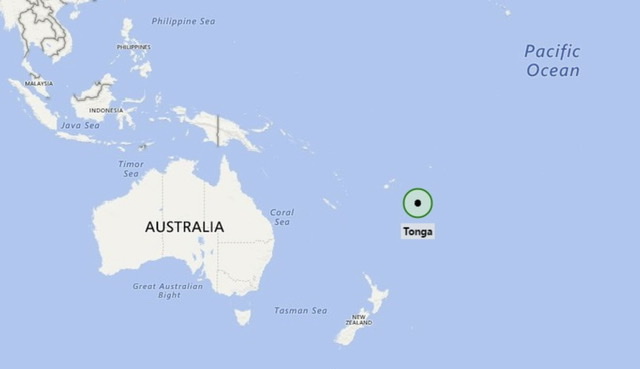
This post is a little out of chronological order because most of it transpired before we splashed, but I didn’t want to miss talking about our month on land in Tonga before Cool Change was afloat. (However, I do want to update you that the fuel uptake to the motor issue mentioned in the last post is now resolved.)
Before we even arrived back in Vava’u, Rick arranged with a guy named Tim, who we knew from our last visit here, to rent us a cute little car with great gas mileage (good thing because gas here is $8 US per gallon). Tim, possibly originally from the U.K., is married to a Tongan woman and has a nice house across from the water on the Bay of Refuge just outside of town. He used to have some rentals listed on AirBnB but they all went to other uses during COVID. He put us in touch with Julie of Vava’u Vacation Rentals. Julie and her husband arrived here by sailboat about six years ago, her husband died of a heart attack shortly after landfall, and she has been here ever since. She hangs with a guy named Bob. She rented us a cute little bungalow (that had been unused since COVID hit) for about 30% of its usual rate, calling it a “cruiser discount.” It was a studio with kitchenette and bathroom right on the water, with comfy chairs on a lovely deck over a windy but mostly undeveloped bay referred to by locals as the “Old Harbour.” A small structure along the waterfront of the Old Harbour is where dozens of people catch rides on small boats that ferry them to and from the outer islands.
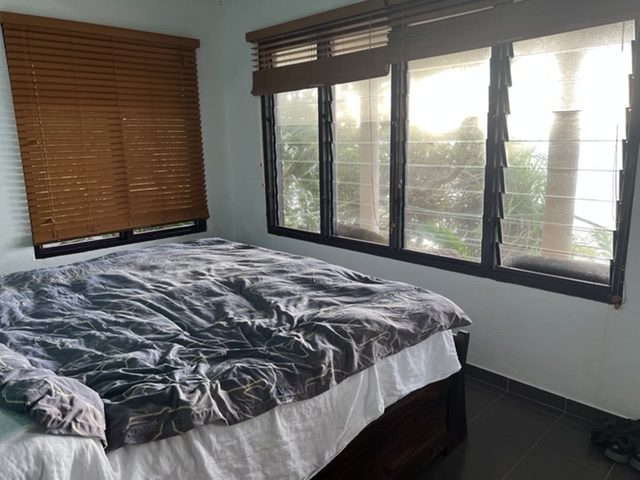
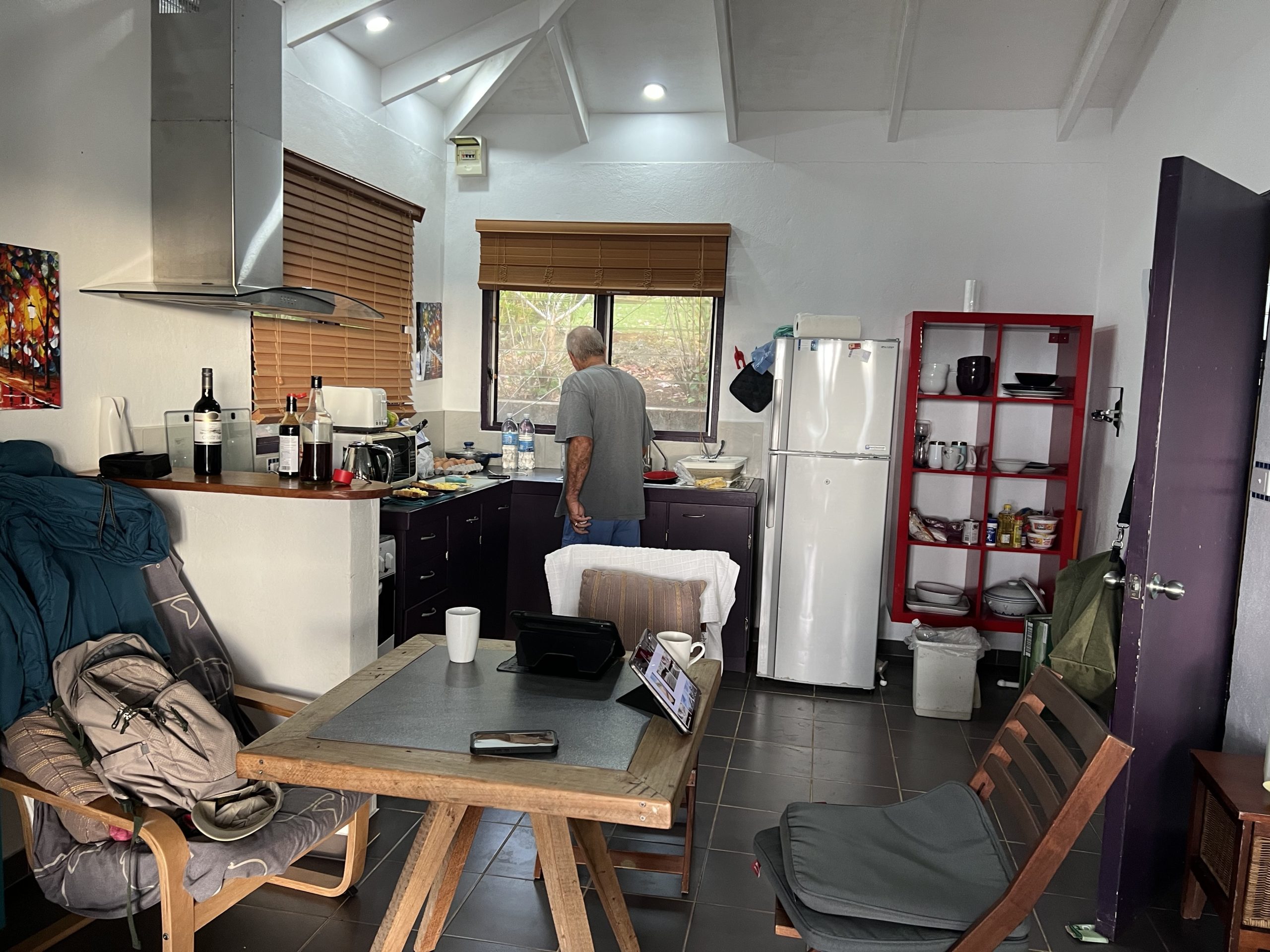
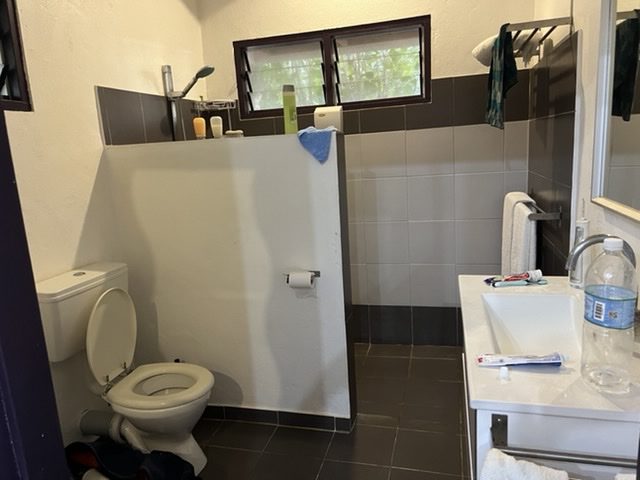
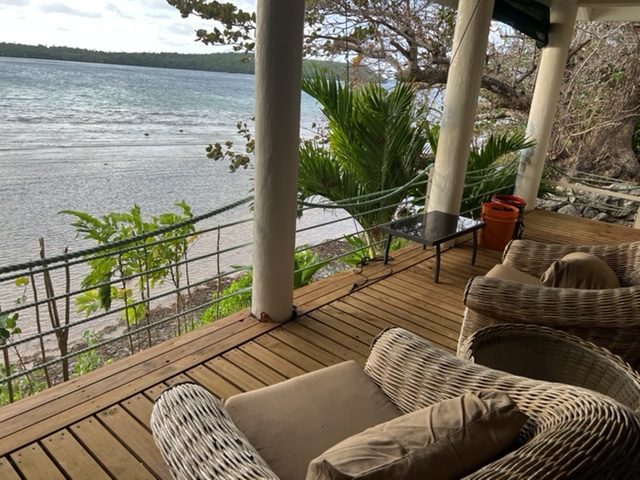
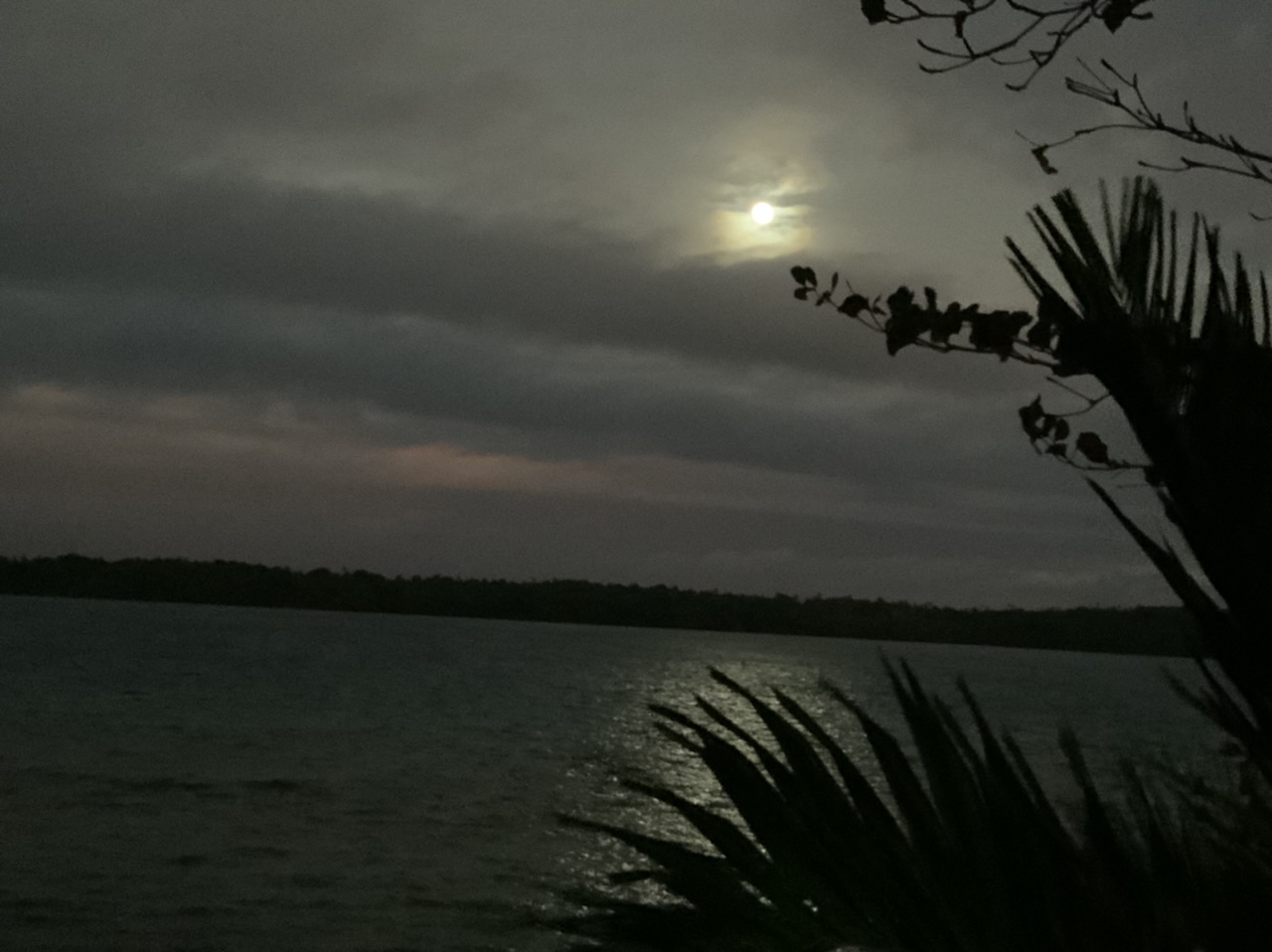
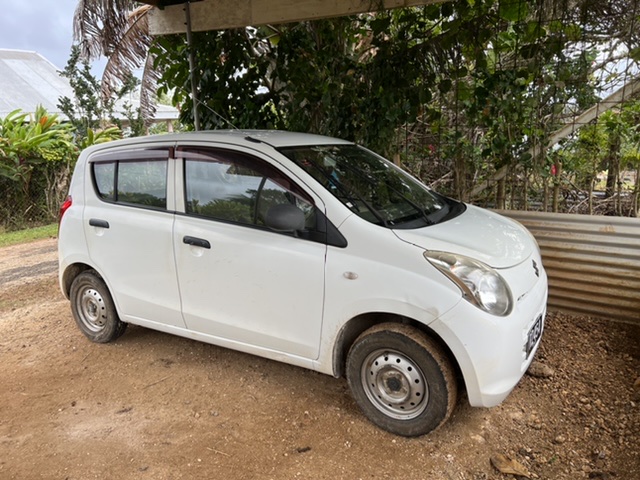
The bungalow was such a sweet refuge from the toils of boat recommissioning. The stove had only one burner that worked, but we managed to cook dinner there nearly every night. It had a good working refrigerator and freezer to store all our food from the market and make ice for our daily cocktail. There were tons of hot water that we used to wash by hand not only our clothes, but lots of covers and other fabrics from the boat that had been mildewing for 30 months. Best of all, if it wasn’t too windy, which it often was, we could sit out on the deck at the end of the day to watch the locals lay out their pandanus fronds on the rocky shelf in front of the property to soften the fronds before weaving, or to collect a type of shellfish from the reef at low tide for eating. We were facing east so no sunsets, but the sunrise was equally beautiful. The yard had banana plants with bunches ripening just as we arrived, and we were told we were allowed to eat them.
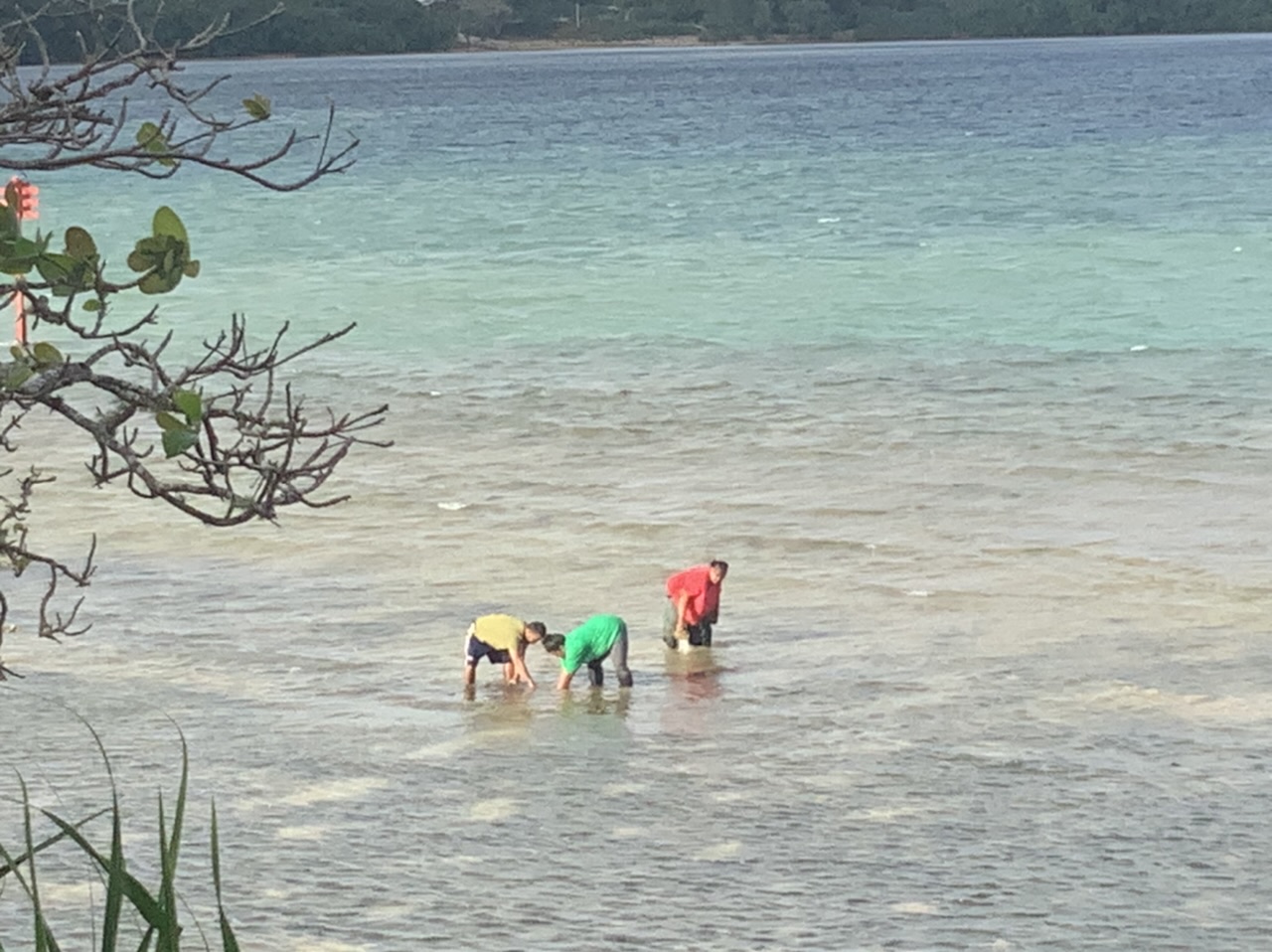
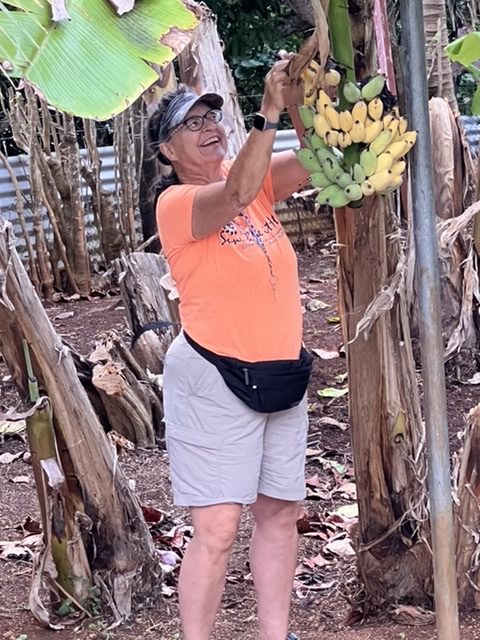
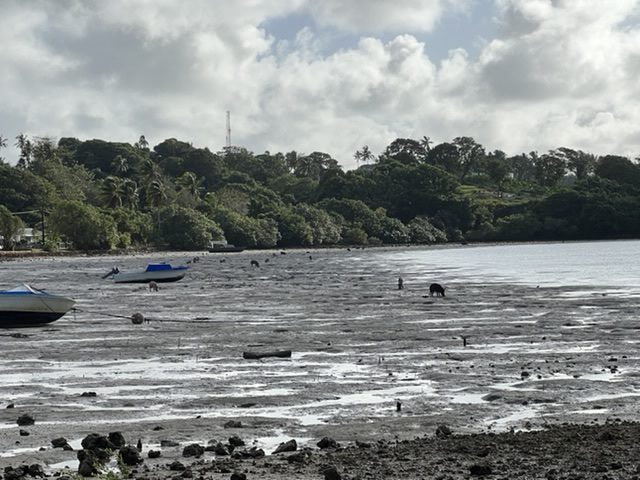
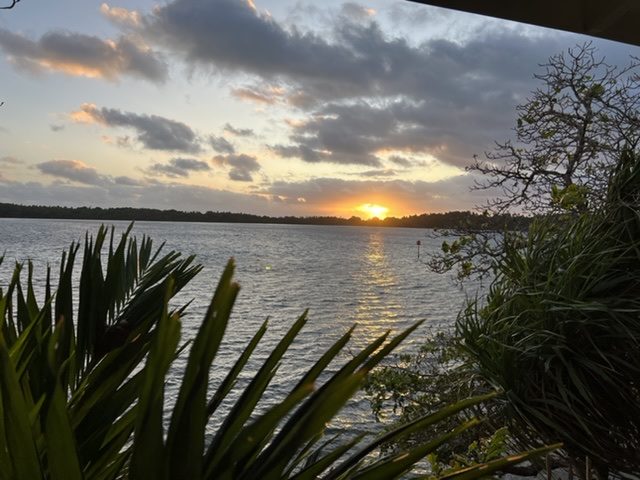
The first ten days or so after we arrived, we went to the boatyard every single day, trying to get a handle on the enormous task in front of us. But on the weekends in the evenings we at least tried to make it out to eat a few times. Bob told us about a new place we should try on the water called The Kraken. It was a new building made up of a large, open space with high ceilings and only waist-high walls; the open areas above the walls were closed off when the business was closed with gigantic shutters hinged from the top. It was owned by a couple from Australia who have been here for 10 years, mostly in the whale-watching business, until they decided to carve out this awesome spot on the water to build the bar and grill around a derelict boat. The local tattoo artist painted a sea monster on the hull of the boat. Especially since the previous cruiser hangout called Mango’s was damaged in a cyclone and never rebuilt, the Kraken is destined to be a very popular spot once the cruisers return.
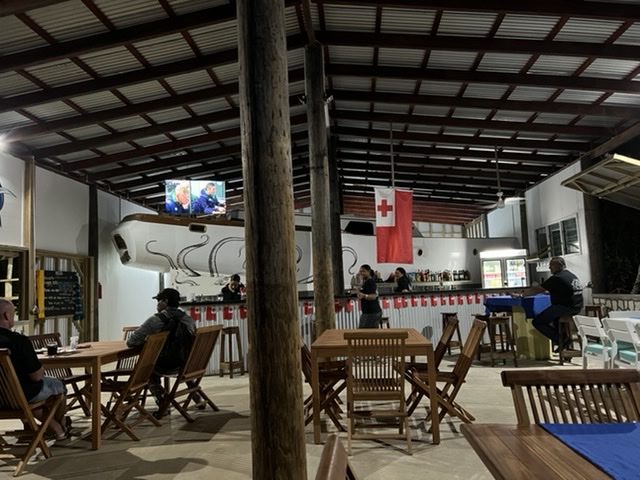
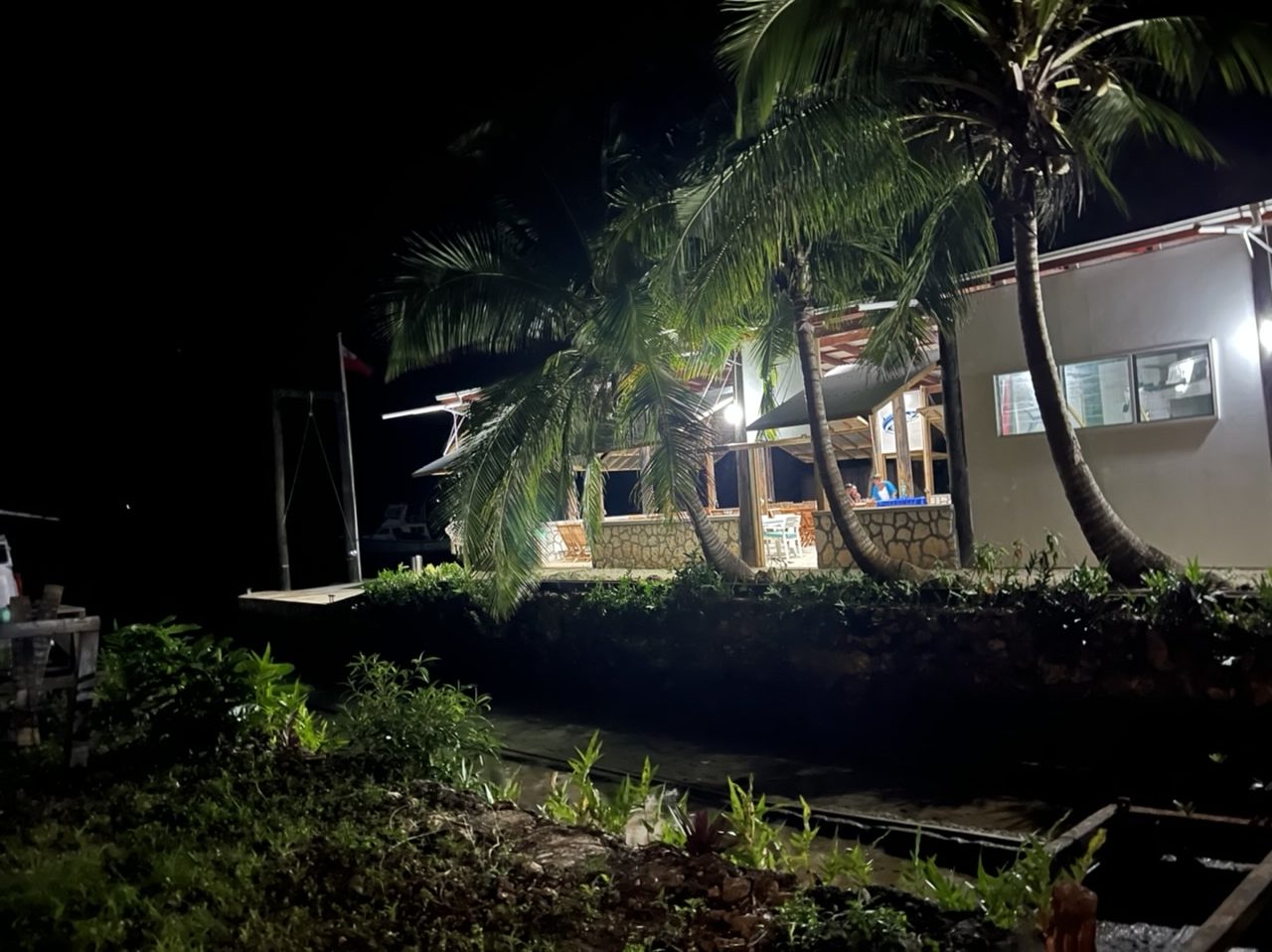
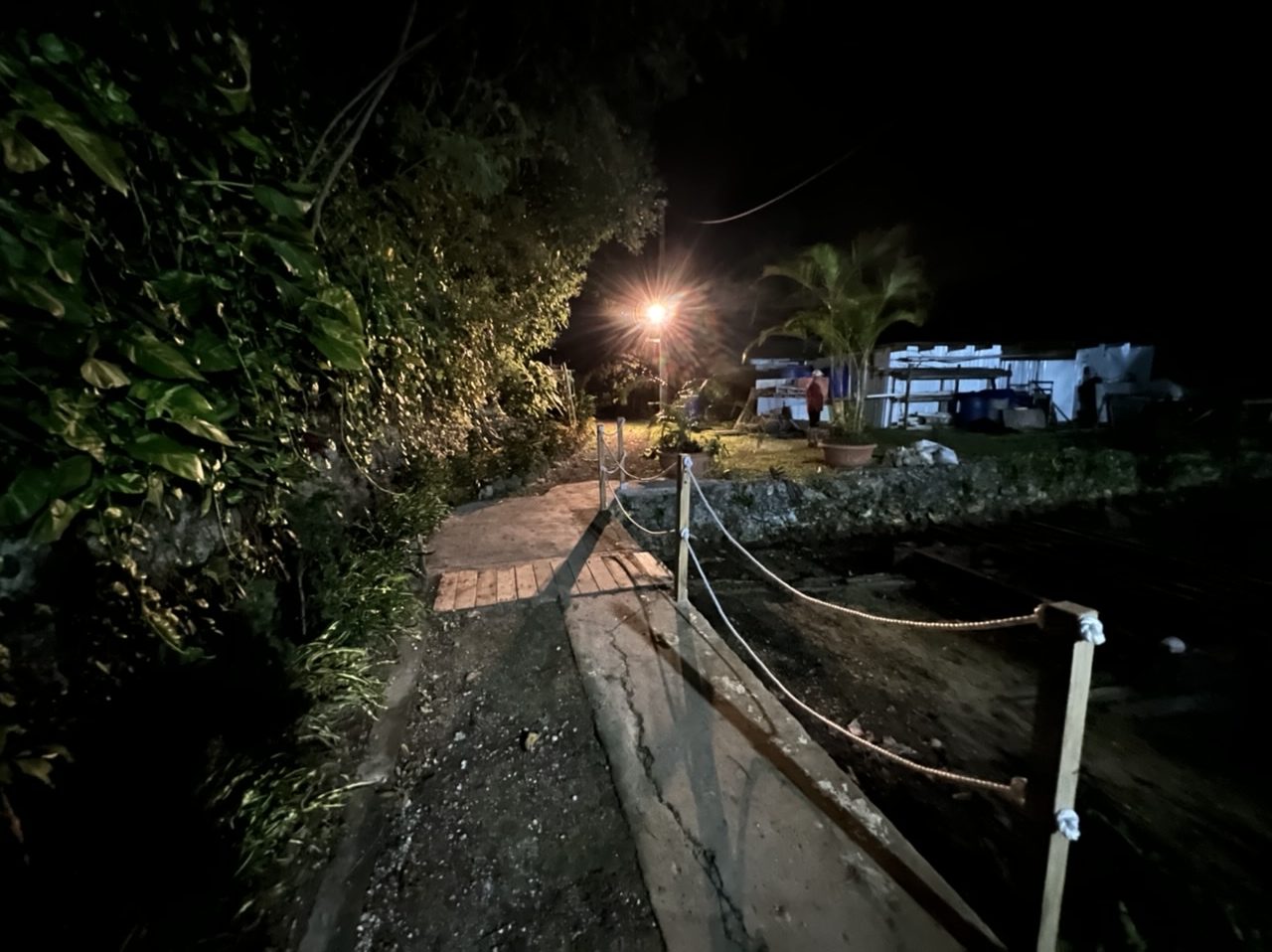
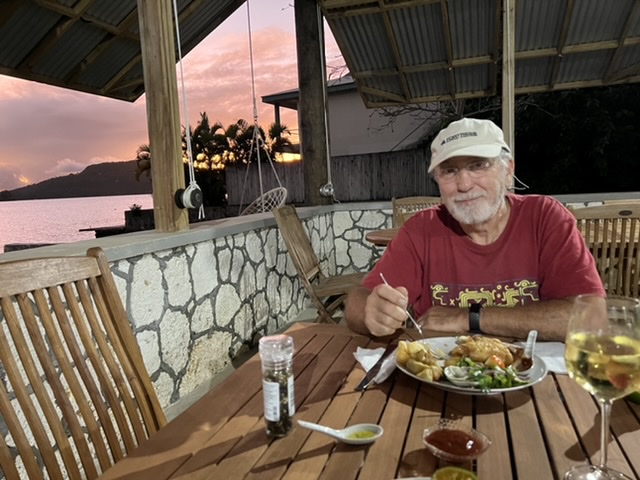
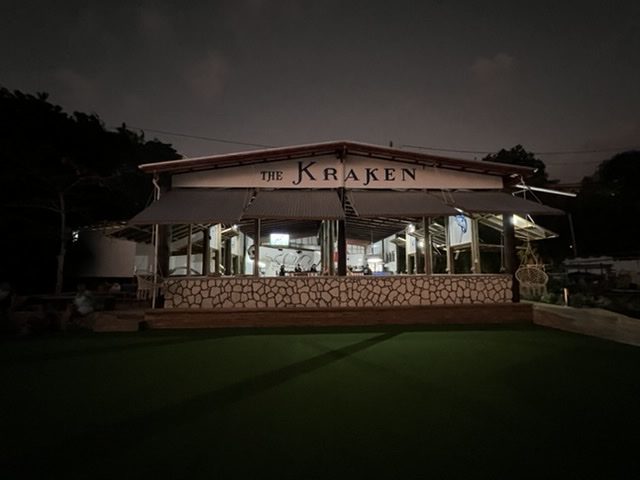
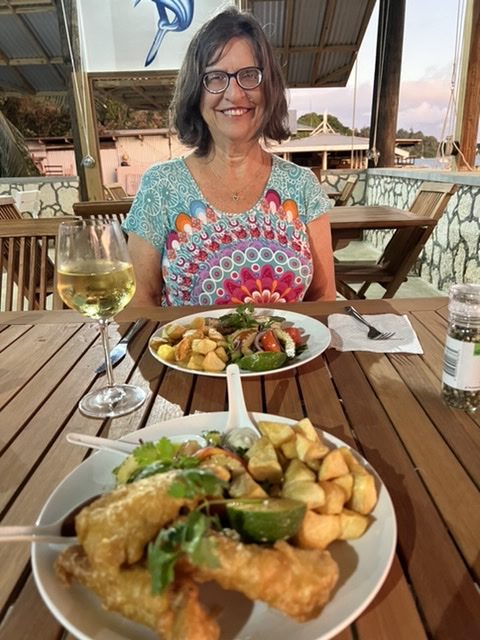
Our first meal in town was breakfast at the Cafe Tropicana, which is Expat-central, the main gathering spot during the day for all expats in the area. We had a delicious breakfast there. Another place we ate a few times is the only restaurant in town that could be considered “fine dining,” called the Bella Vista. It does have a nice view, the presentation is always elaborate, and the food is not bad. Rick’s birthday fell during this first month in Tonga, and we spent the entire weekend celebrating it since one could argue that his birthday should be celebrated on two days – one on the day that everyone on the other side of the dateline thought was his birthday, and the other on the actual date here that was the date of his birthday. One of those evenings, we celebrated at the Bella Vista.
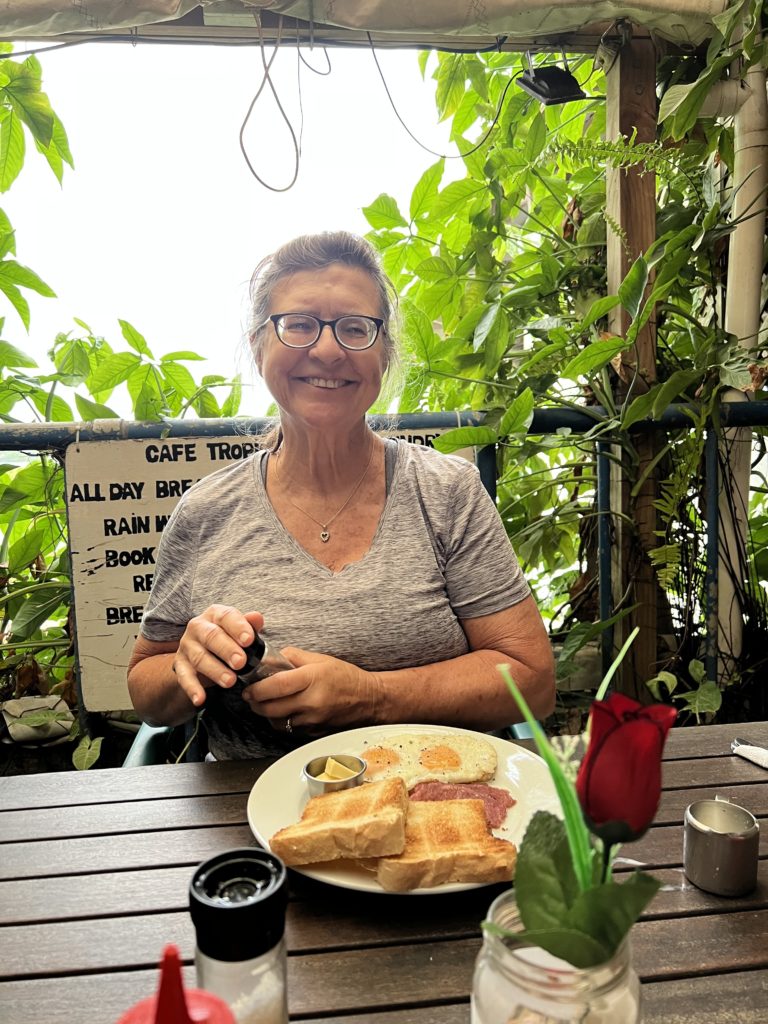
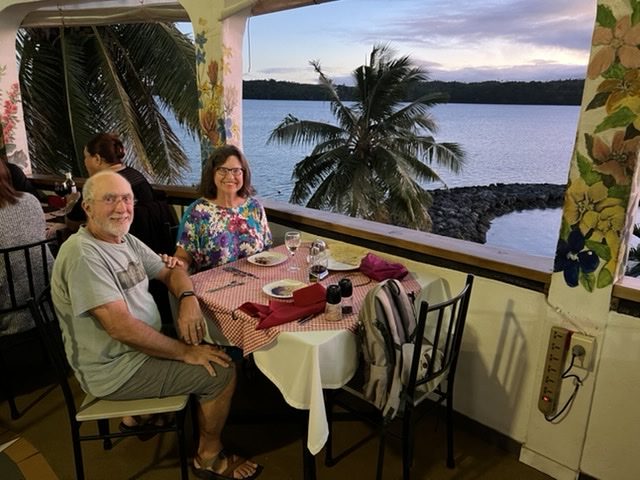
We also took an afternoon off for Rick’s birthday and went for a drive out to the remote island where we stayed when we decommissioned almost three years ago, about 30 minutes from downtown Neiafu. With gas prices as high as they are now, we were certainly grateful we were staying closer in this time. But it was nice to see the countryside again, and be reminded of how in Tonga, PIGS RULE!
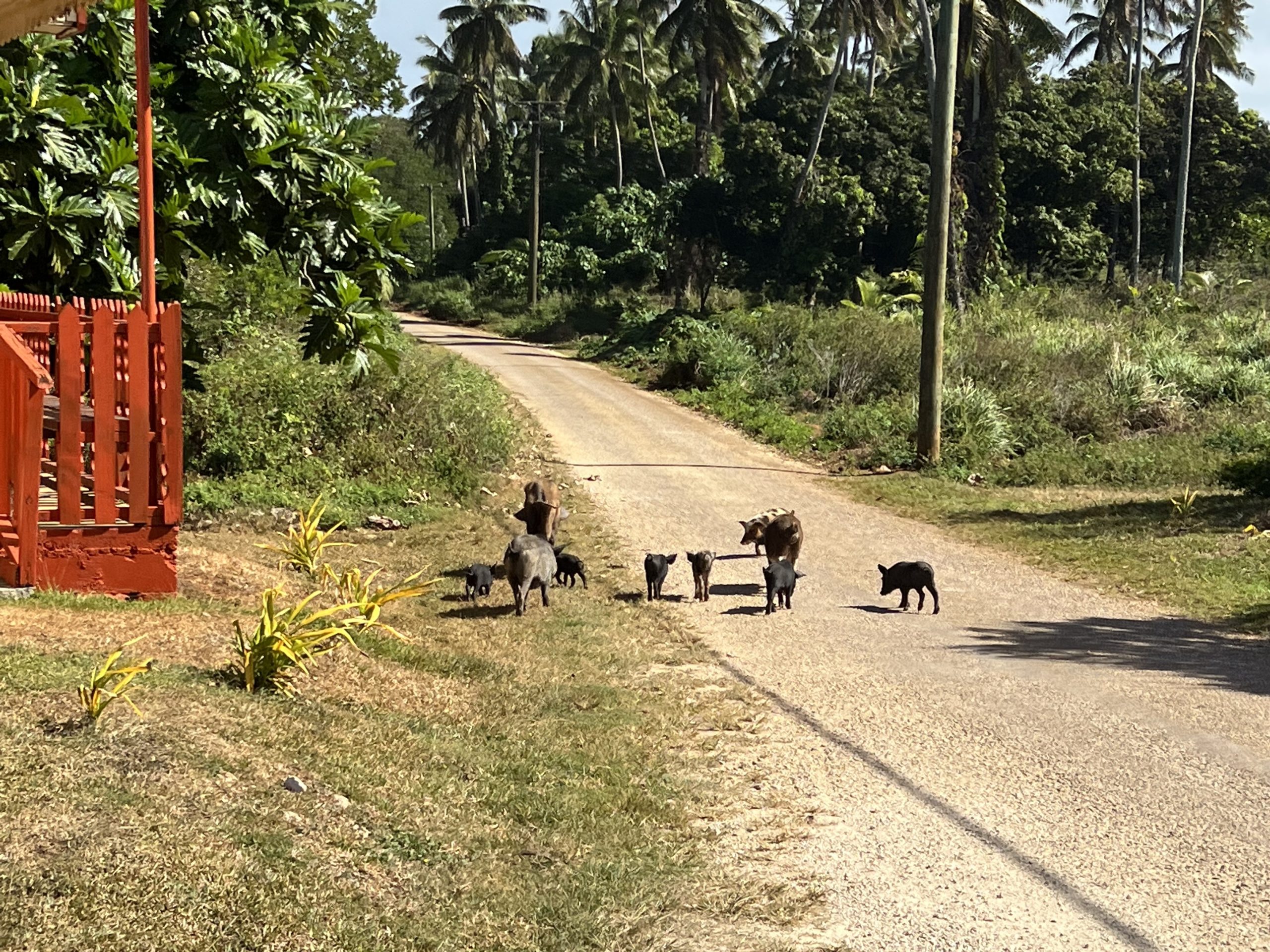
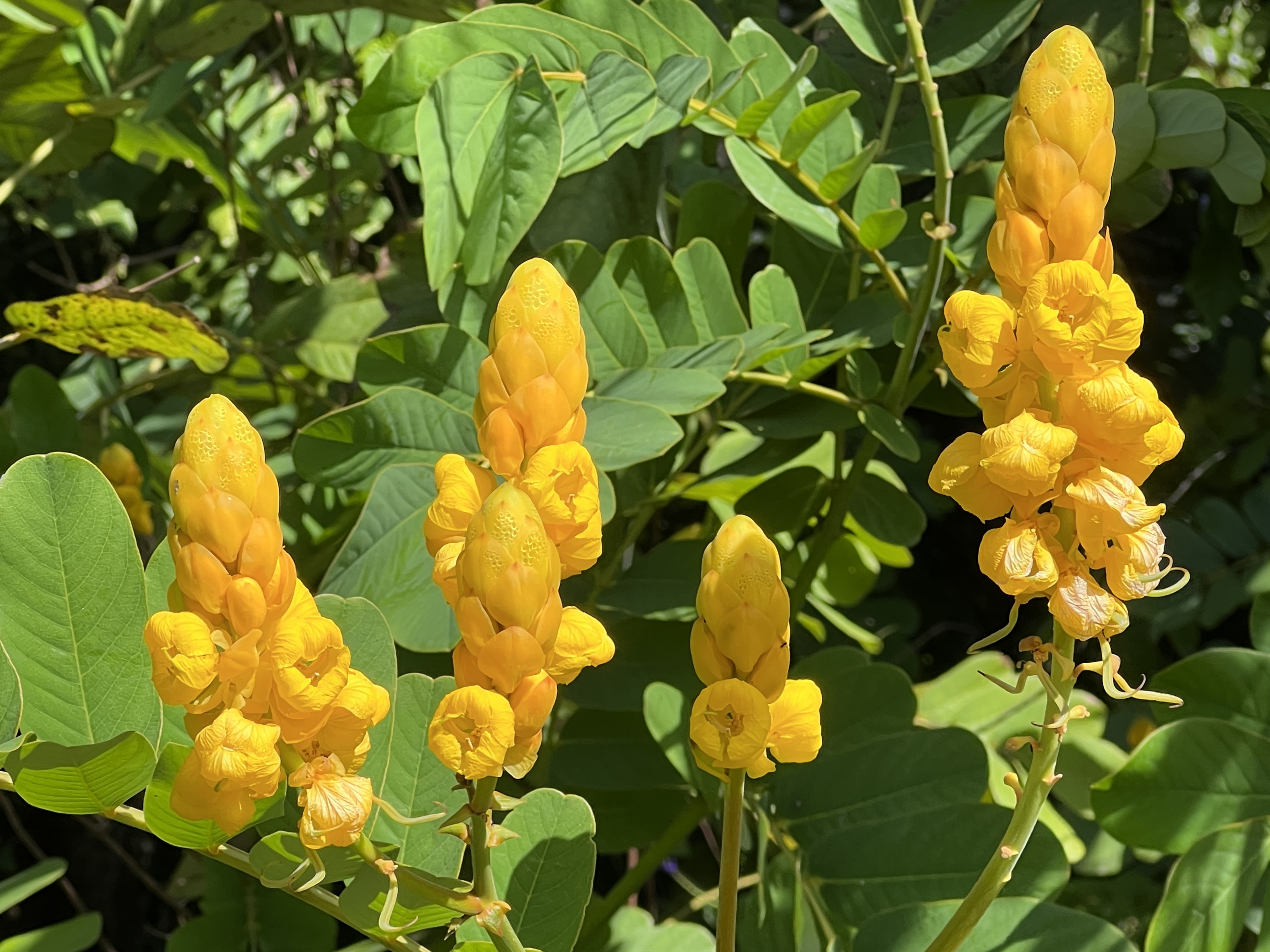
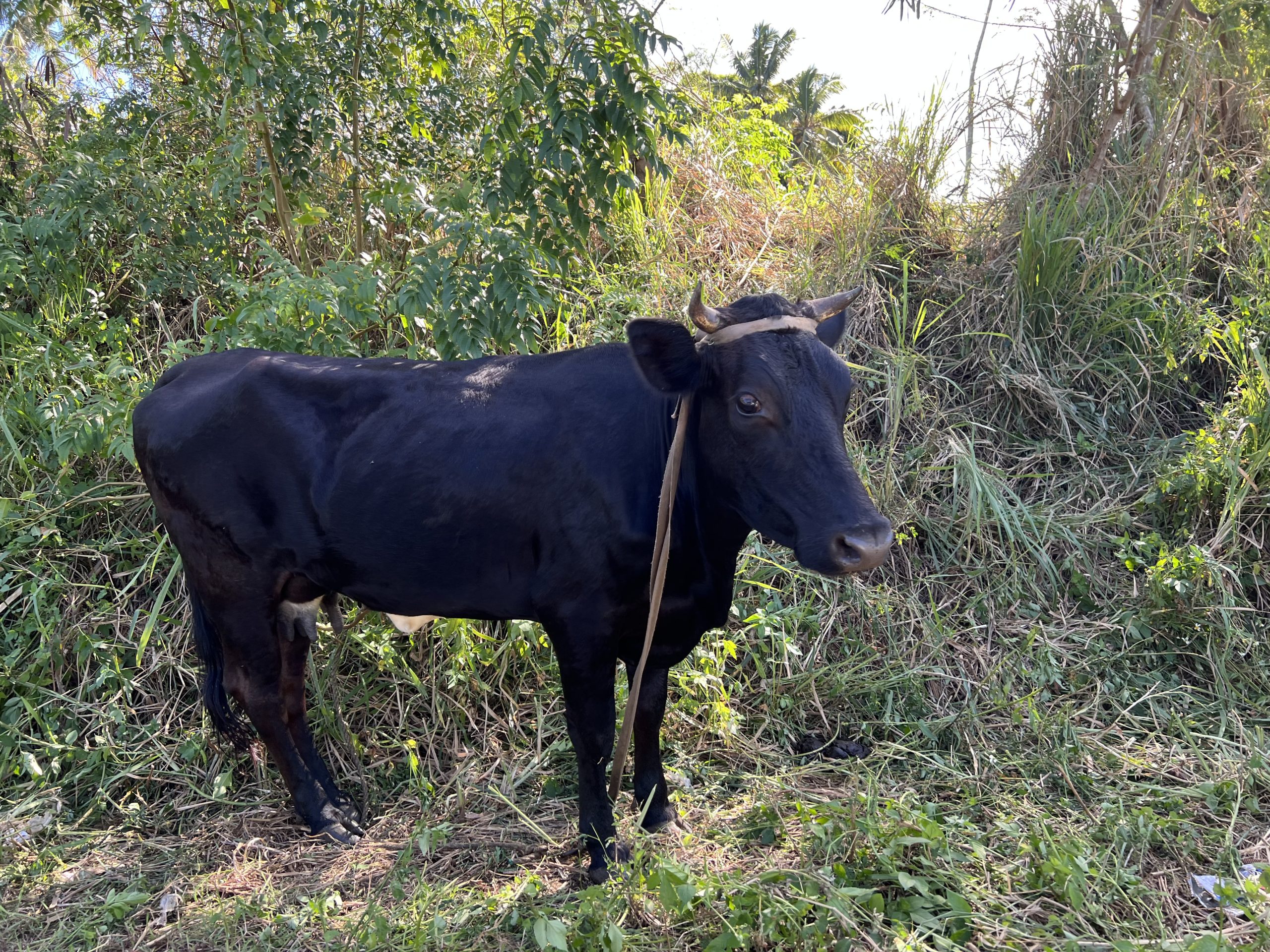
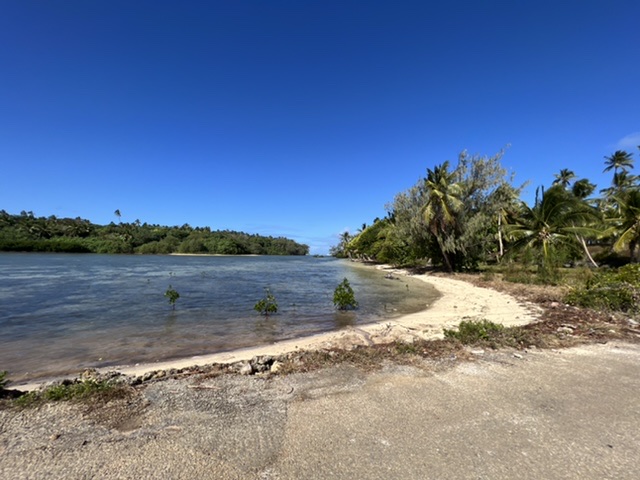
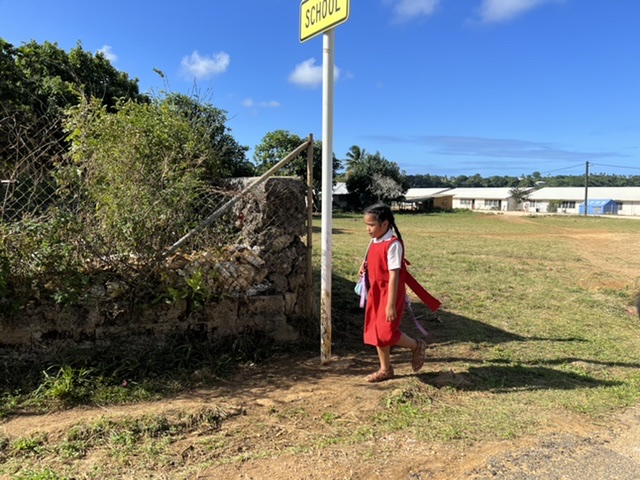
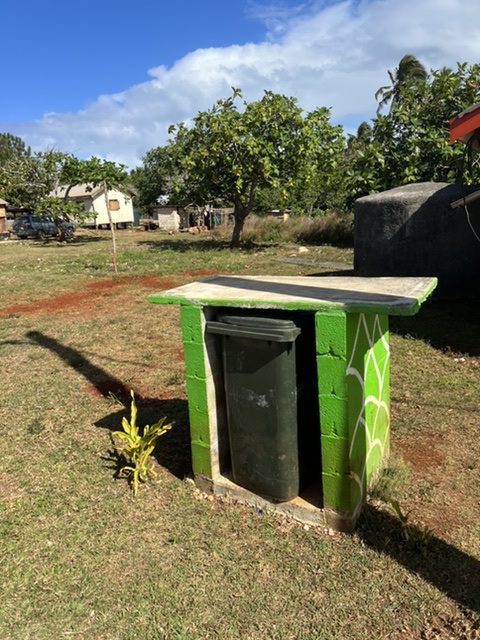
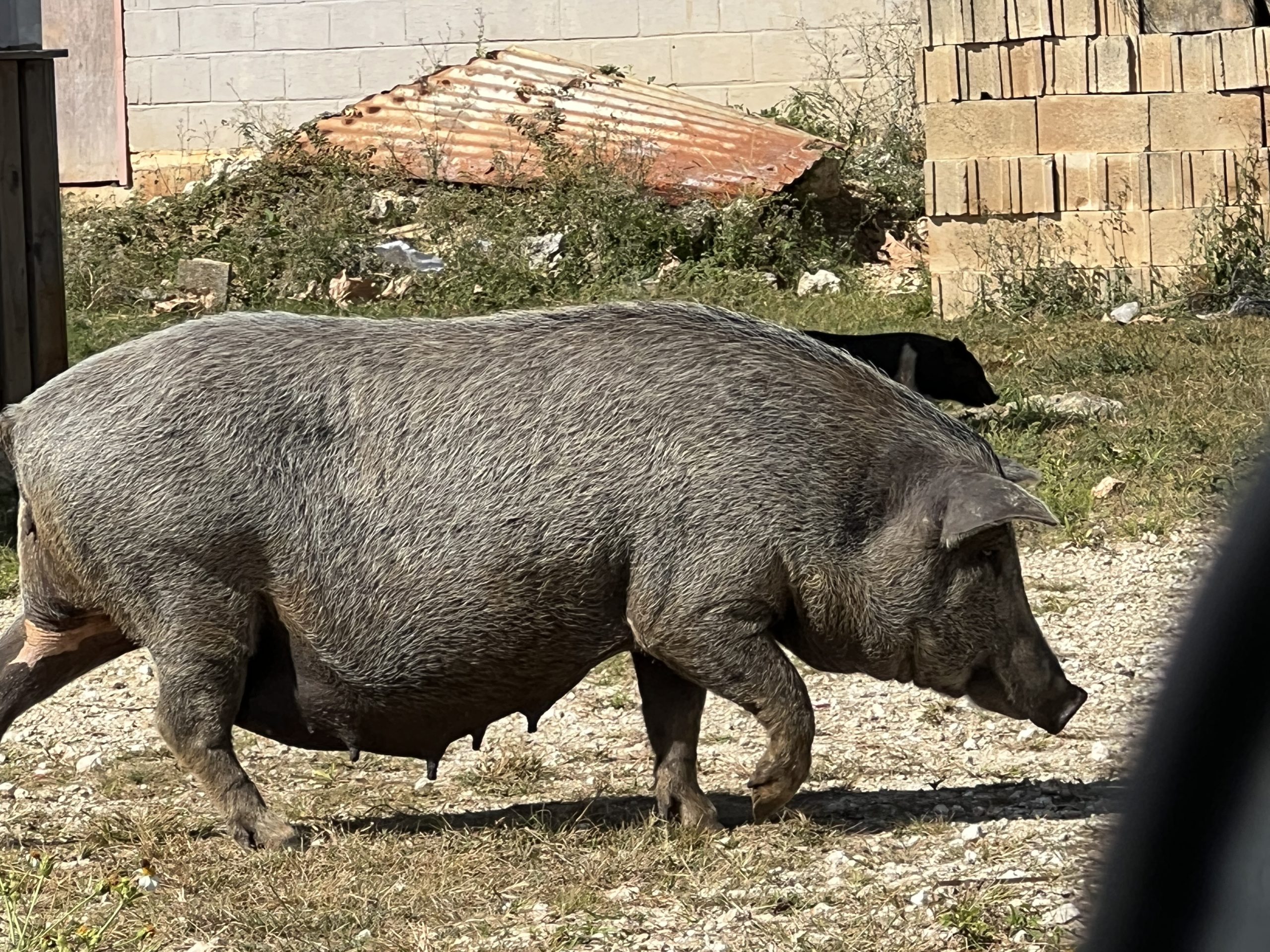
During our four weeks on land, we also managed to take a drive to a deserted beach one day, as well as explore the highly agricultural, rural region of the northwest corner of the Vava’u Group (you can’t drive to all the islands, but many of them, you can, thanks to one-lane causeways.). After having visited what feels like half of the beaches that exist in the world without much luck finding intact shells, I was delighted to find some on this deserted beach. Finally! But then I discovered they were inhabited by hermit crabs. I took them back to the bungalow and put them in a bowl filled with fresh water, hoping the crabs would either die a quiet death or crawl into another shell I provided for them so I could have their shells. But instead, all night long, all I could hear was one of the hermit crab’s shells scratching against the side of the porcelain bowl as he was trying to get out of the bowl. It kept me awake and made me feel terrible. Yes, I eat crab, so why the sudden pang of guilt in killing a few? Anyway, my conscience got the best of me so in the middle of the night, I went out onto the deck and tossed both of the hermit crabs inside their precious shells, back into the ocean.
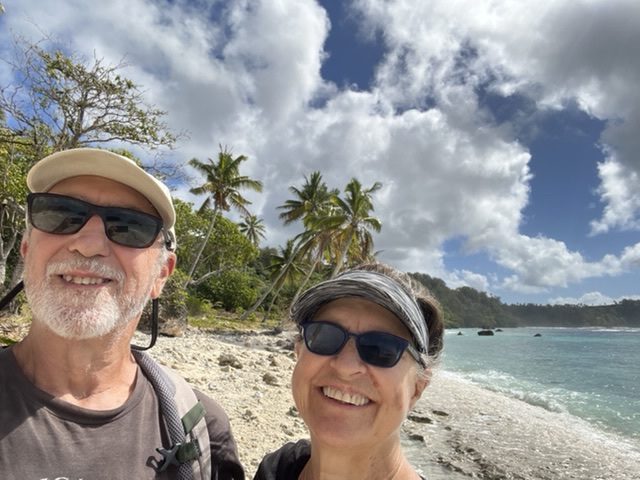
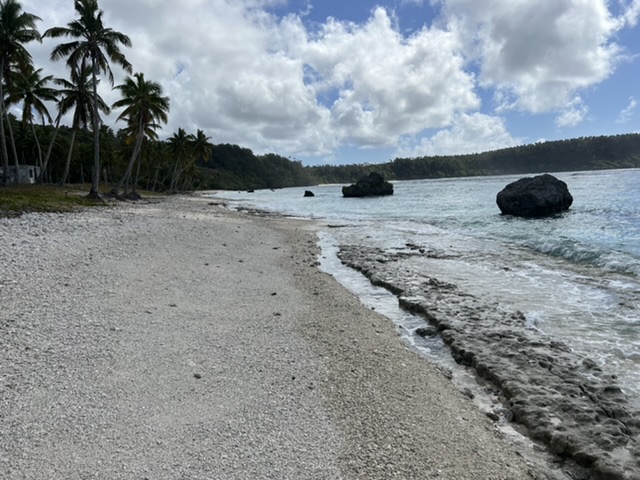
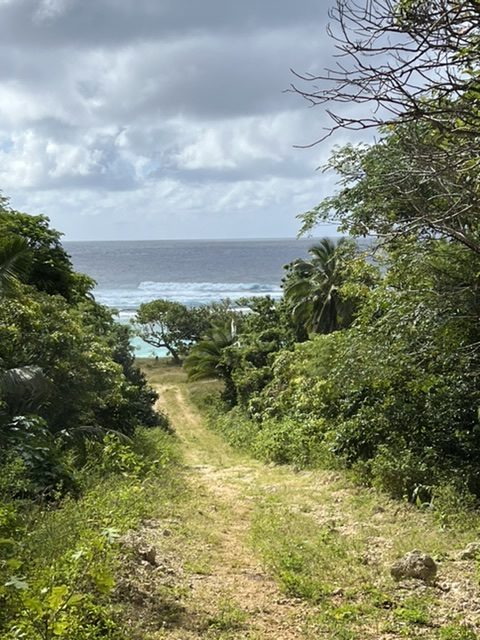
The day before we had to give up the car, we took another ride, this time up to Mt. Talau State Park. The hike up to the lookout was steep and the 177 cement stairs weren’t level, so it was more of a climb than a stairway, but the view at the top was worth it – you could see many of the islands that make up the Vava’u Group. We met a nice young 17-year old student named Uluaki and his sister Lesieli Similai there. He wanted to take us to a secret cave where the source of the mountain’s name could be found. That would have been fun, but partway there my sensible self got the best of me and I insisted we turn around – we were walking down a hillside through a dense forest on a faintly marked path, I had a dress on, and the sun was about to set. Too bad we didn’t arrive earlier; we could have been treated to something very special, perhaps spiritual. Uluaki was a treat nevertheless. He was the seventh of 11 children and his father had passed away; his mother ran a farm. He was in the second to last year of high school and was studying math and agriculture, saying he loved farming. His English was quite passable and he was fascinated by Palangi, the word they use to refer to foreigners.
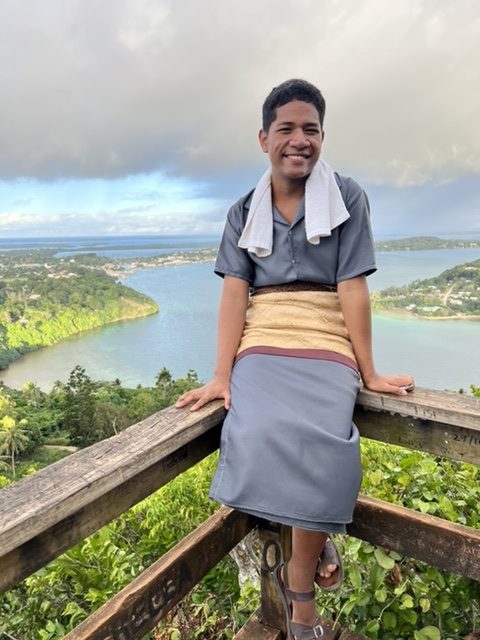
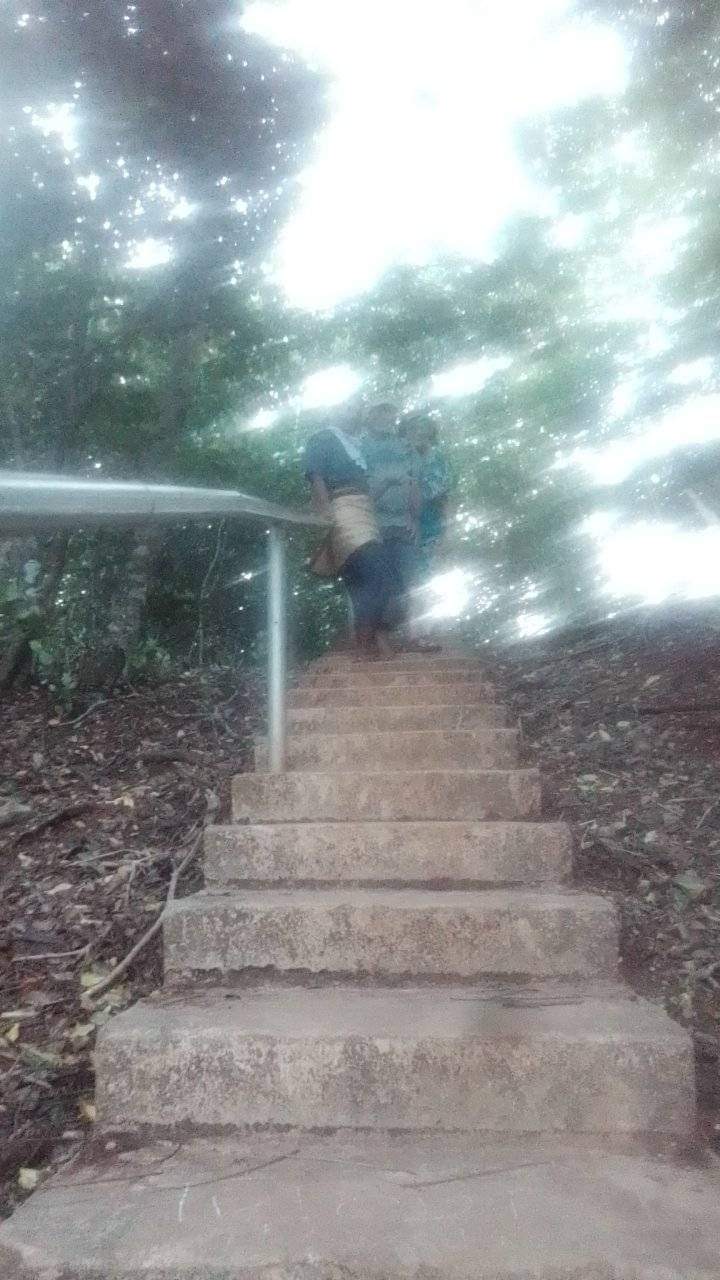
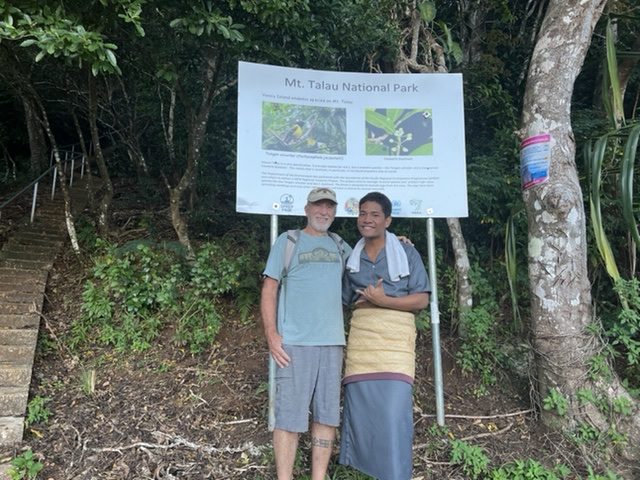
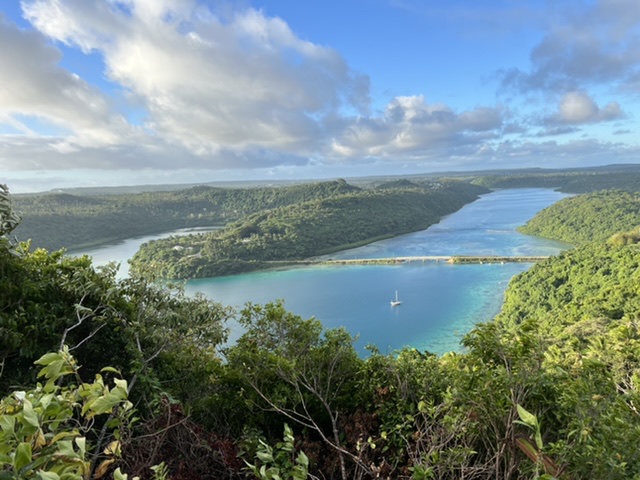
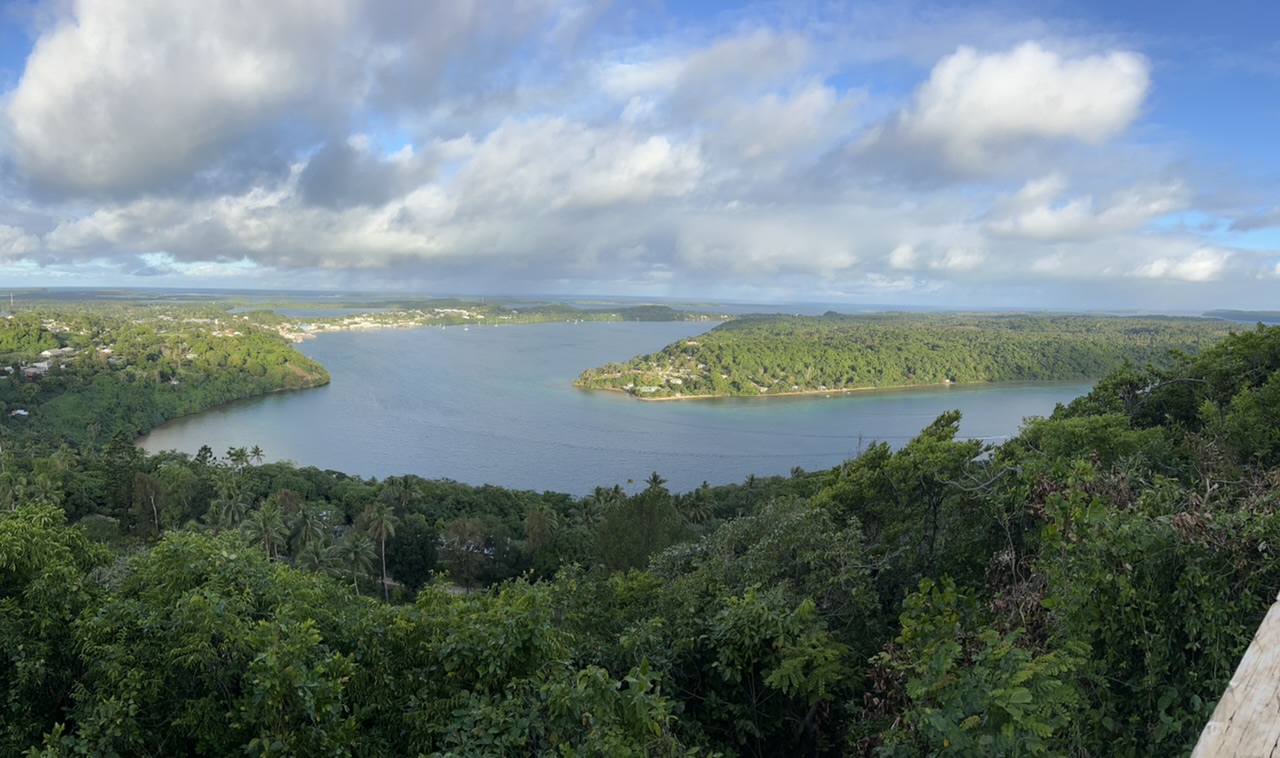
For three luxurious weeks we slept at night at the bungalow while working on the boat during the day, but the last week, we gave up the bungalow and moved on board. Living on board when the boat is not in the water is not pleasant, but I took the climbing up and down the ladder to get on board as a challenge to get my hips in better shape. The old woman in me with both hips replaced stepped up the ladder one step at a time with the same foot leading all the time, and vice versa down the ladder. But the sailor in me realized that method was not doing me any good – I needed to strengthen my hips to be able to rely on them equally. So I took it as a personal challenge to walk up and down the ladder, alternating legs. I think over four weeks, it may have made a difference. And life aboard on land wasn’t all bad – every day we shared a small papaya with lemon for lunch, at a cost of about 50 cents US each. Or ate our freshly picked bananas. Lovely. And as the sun set, we walked down the boat ramp with our camp chairs and watched the sunset while discussing our progress towards launching. The boatyard dogs always came to visit us.
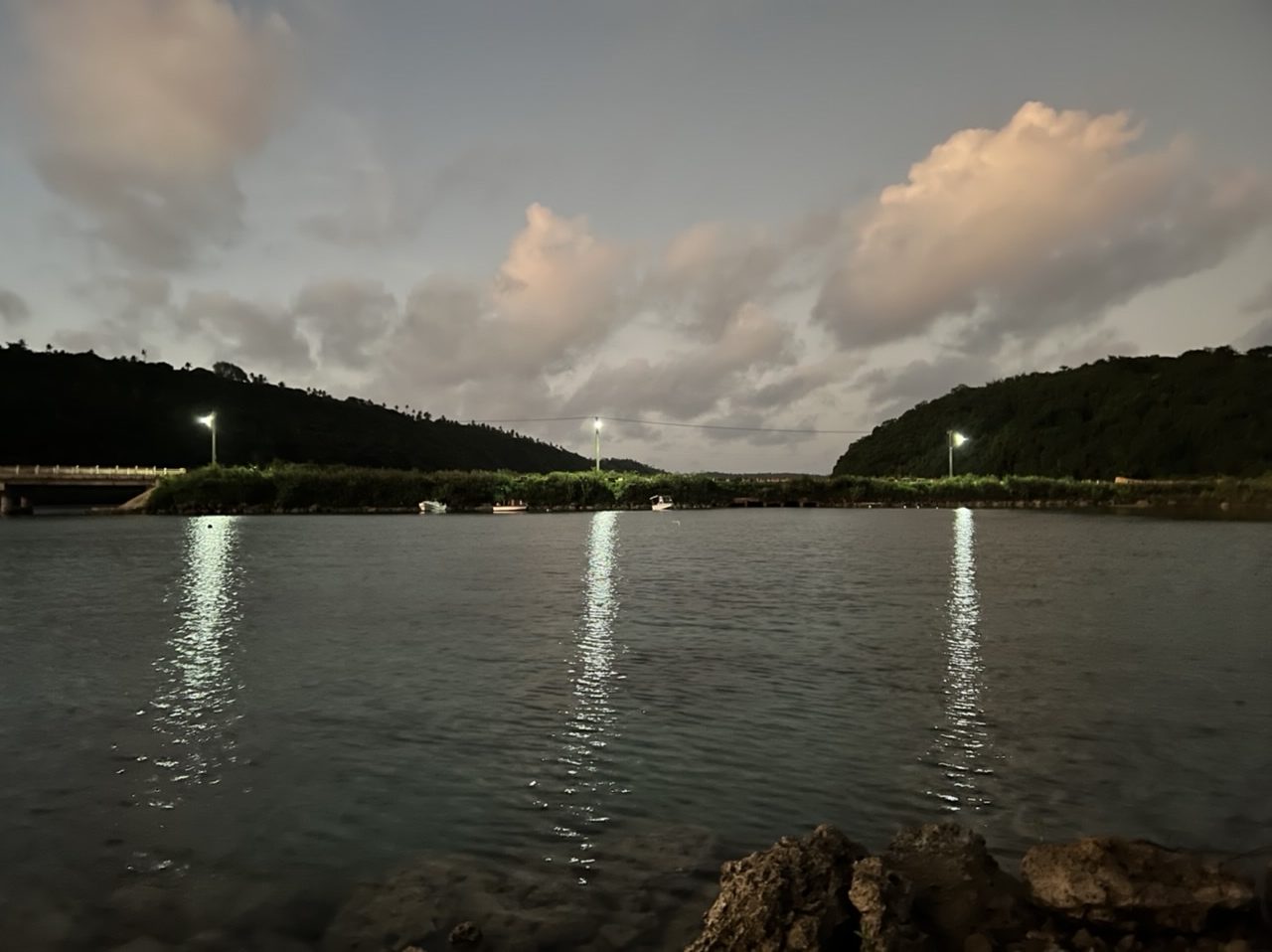
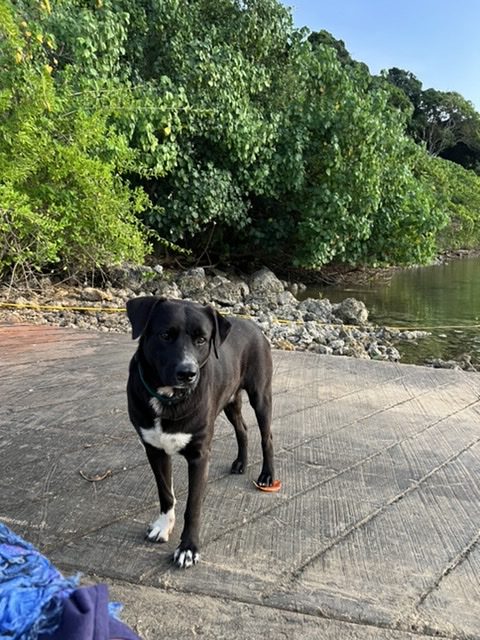
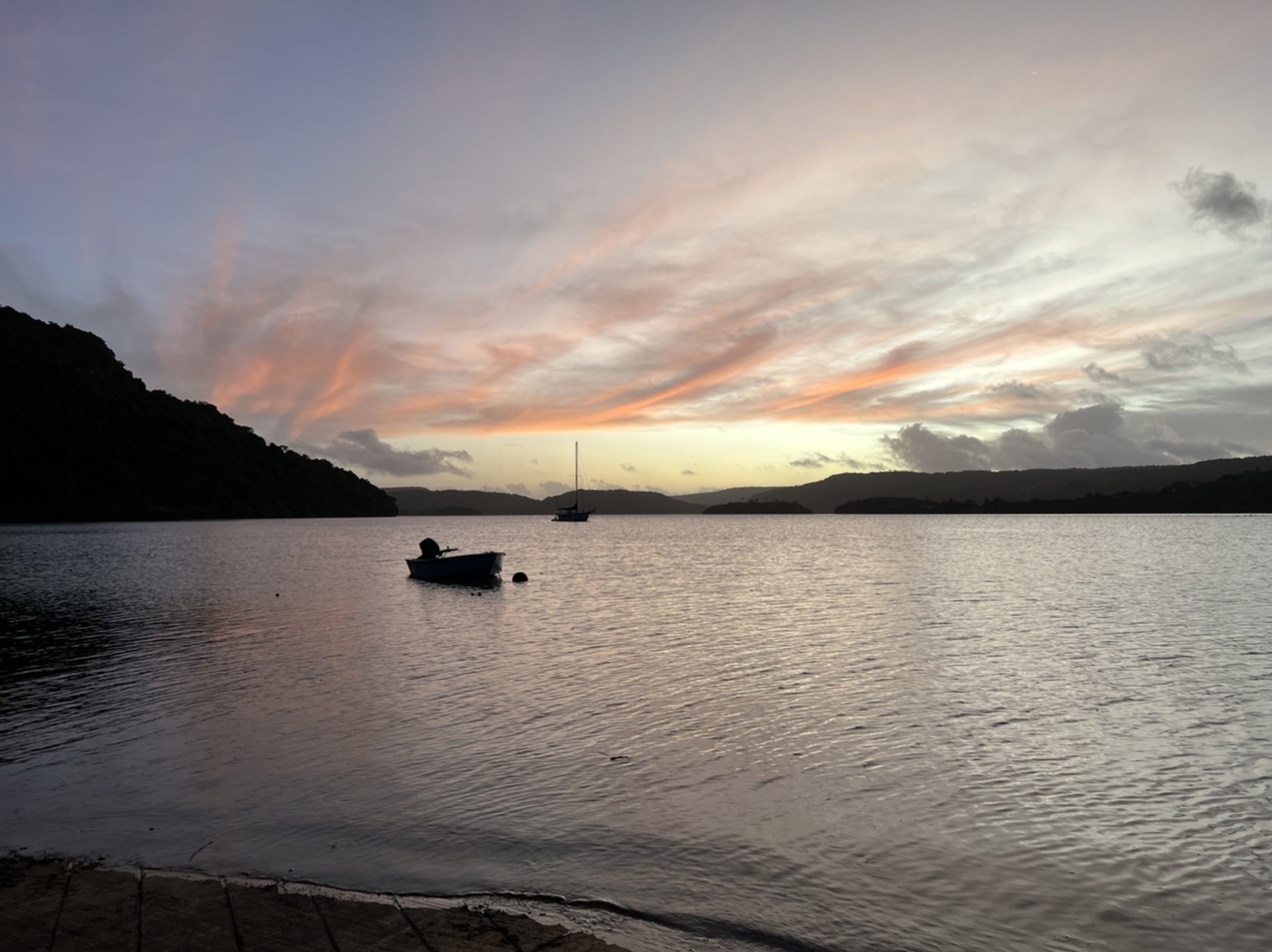
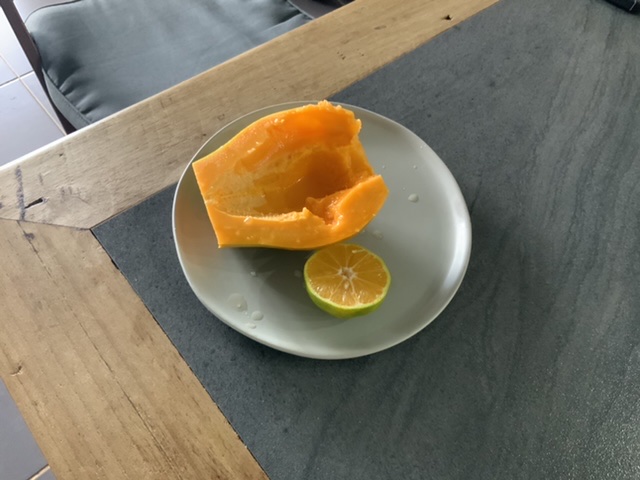
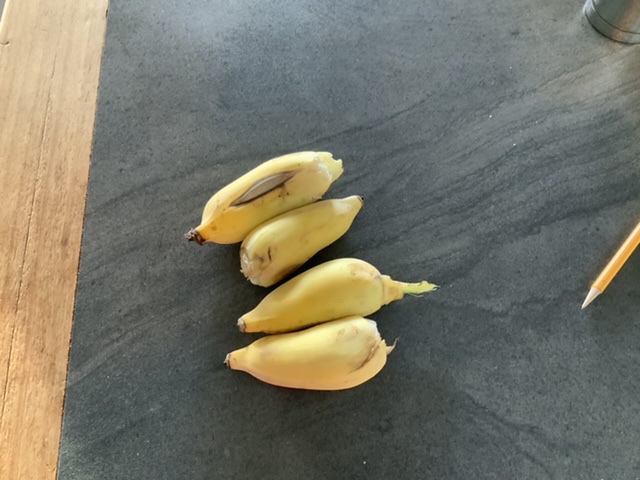
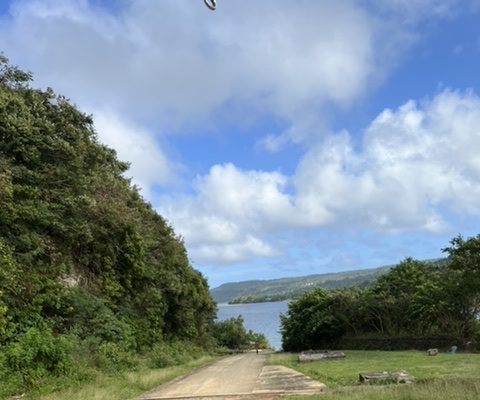
It was also fun getting to know the local expats a bit. We were considered somewhat of a celebrity couple because no one had seen anyone new on the islands since COVID first closed the borders back in 2020. New faces meant new things to talk about. When we needed to pay her for an extended stay, Julie, who found us our bungalow, and Bob, her partner, met us for a drink, and introduced us to the expat owners of two prominent business establishments in the area – the Basque Tavern and the Mystic Sands hotel. The Basque Tavern is owned by a Spaniard from the Basque Region, who has built a family here including a handsome young son. Mystic Sands is owned by a Norwegian man and his South American wife, whose son is best friends with the Basque Tavern owners’ son. Then there are Barry (Bear) and Char, tireless Canadian entrepreneurs who seem to scrape together so much from so little, first running a ramshackle floating fish and chips bar called The Hideaway that eventually sank, to now making a go at running a deli and three pizza shops.
Al, Dora and Cyro at the Vava’u Boatyard are all inspiring characters as well. Al is from South Africa and is the co-owner of The Boatyard. Joe from Great Britain is the other owner. Joe lives in New Zealand, but has been locked out of Tonga since COVID so Al has had to run the Boatyard all by himself. Al’s wife, Bo, runs the Yacht Shop in town, which also provides all the supplies for work done in the boatyard. And Bo’s parents run the local laundry shop! They all sailed here together about 10 years ago. Dora is a smart, attractive young woman whose father is from Oklahoma and whose mother is Tongan. She was born and raised in Tonga but then went to the States and graduated from Oklahoma State University with a degree in accounting and international business. She speaks English without a Tongan accent. She runs the Boatyard office without excessive gossip, which is at pandemic proportions on a small group of islands like these. Cyro is a handsome young Frenchman, kind as can be, and loves his job as a skilled laborer in the Boatyard. He lives on a sailboat that the Boatyard sold him, which is moored just outside the Boatyard.
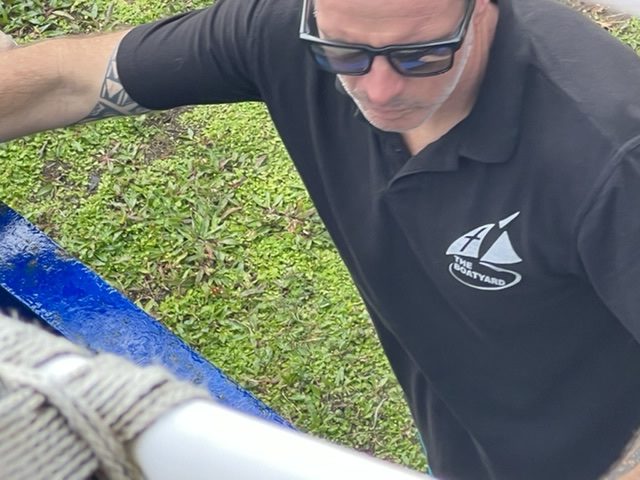
These people have also given us a bit of insight into life here in Tonga as expats and business owners/workers. One thing we learned is that the reason Tonga has been so slow in opening their doors to foreigners after COVID compared to the rest of the South Pacific is that the government doesn’t really care about tourist dollars. The reason they don’t care is that Tonga doesn’t really have an economy independent of the support they get from the U.S., Australia, New Zealand, Japan and China. The reason they get so much support from other countries is that Western countries are trying really hard to prevent China from dominating the South Pacific. But China is winning, according to Bob. Most of the grocery store owners and their workers here in Vava’u are already Chinese, although there is some animosity towards those establishments. (You know them by their adding machines that say the numbers in Chinese.) China is quietly making its way into every day life here, unlike the West. For example, while the West supplied a brand new toy in the form of a Police boat that the Tongans promptly sank by going out in bad weather, the Chinese continue to supply trucks that keep the roads maintained. China is supporting essential infrastructure while the West is looking for photo opportunities.
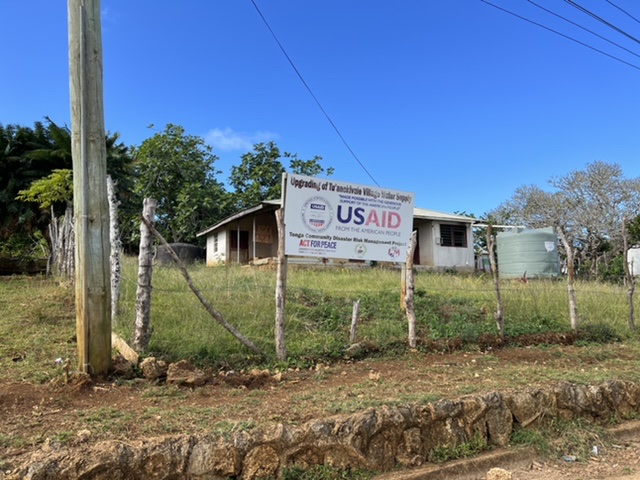
Likewise, we are finding out that the best way to get things done here in Tonga has always been to get to know the right people and make a back room deal. Many of the business transactions were a bit nefarious. Rules and regulations were more of just a suggestion. Bribes abounded. And the foundation of many people’s businesses relied upon those good relationships. But things are supposedly changing. Tonga is slowly trying to become more modern, but lots of people will suffer in the transition, and the situation is so ambiguous that no one really knows how to get anything done anymore, so lots of things don’t get done!
And then there is the gossip. Oh my gosh the gossip. I guess it is to be expected for such a small population of people, even smaller if you consider just the expats and their families. And the gossip situation was made a million times worse because there has been no new blood for 28 months now, due to COVID. Our favorite piece of gossip was that the local mechanic, a friendly, kind, unassuming older gentleman, is being brought up on drug charges that could put him in jail for the rest of his life! Say what? He certainly didn’t seem like a drug dealer! But what happened was that a raft of hundreds of pounds of cocaine drifted up on the shores of an outlying Tongan island. It was a raft designed by high-tech drug dealers, with the cocaine hidden under the raft, complete with GPS and everything. Somehow it must have been lost in a storm in the South Pacific and ended up washed up in Tonga. Locals swooped it up, either thinking they could make a quick buck by selling it or just thinking it would come in handy somehow – a novelty they couldn’t pass up. The mechanic got wind of it and got some himself. Who knows what his intentions were, and some say it was all his wife’s fault that he even took any in the first place. But most of the people who found it and took some have now all been identified and arrested. I didn’t dare ask the mechanic about it personally, even though he did some work for us. With all this gossip, I just wonder what all the expats are saying about Rick and me? Haha!
And in the category of “who knew?”, who knew that when you cut off a “hand” of bananas from a bunch of green bananas directly off a banana plant, your own hands become full of the stickiest glue you could ever imagine? And if you accidentally touch your face or hair with you hand that has the sticky glue, it will take days for the glue to come off? The gardeners took with them all of the remaining ripe bananas when they paid their monthly visit to the fale we were renting, much to our dismay because we were told we could eat them, so before we left, I cut off a dozen or so green bananas from another plant in the yard to take with us to the boat. I thought at first that maybe the plant had been infested with some bug that released a sticky goo, but no, upon research, I discovered it was the banana plant itself! It is as sticky as if superglue had been left to dry on your fingers, but remains tacky until you get it all off.
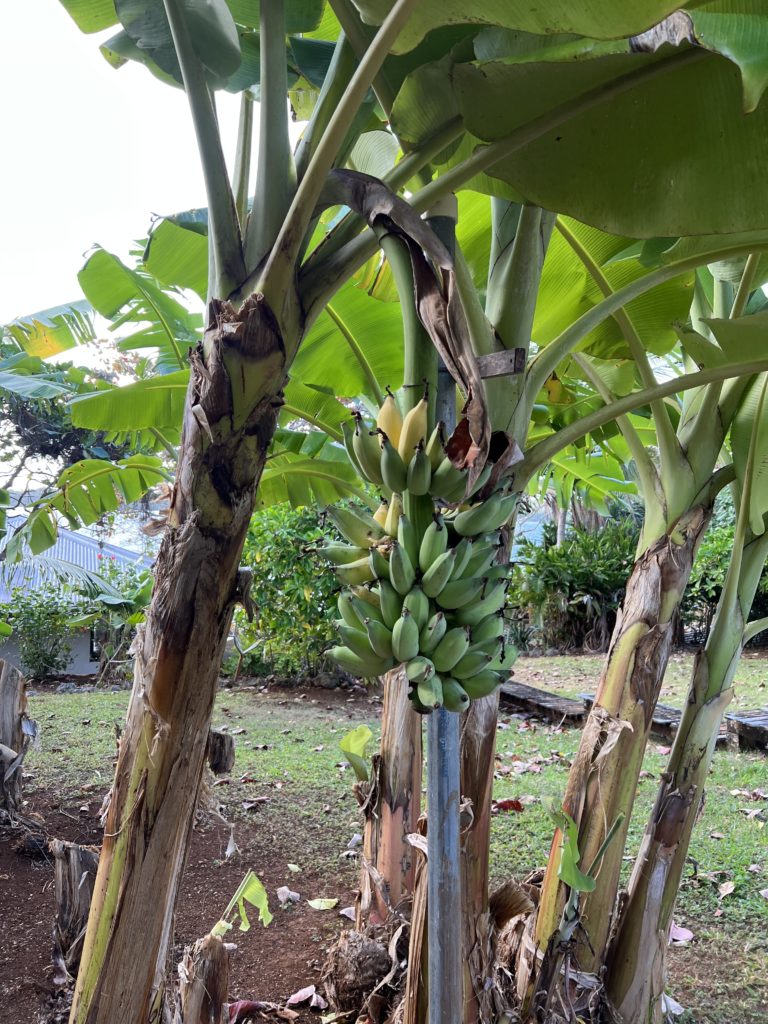
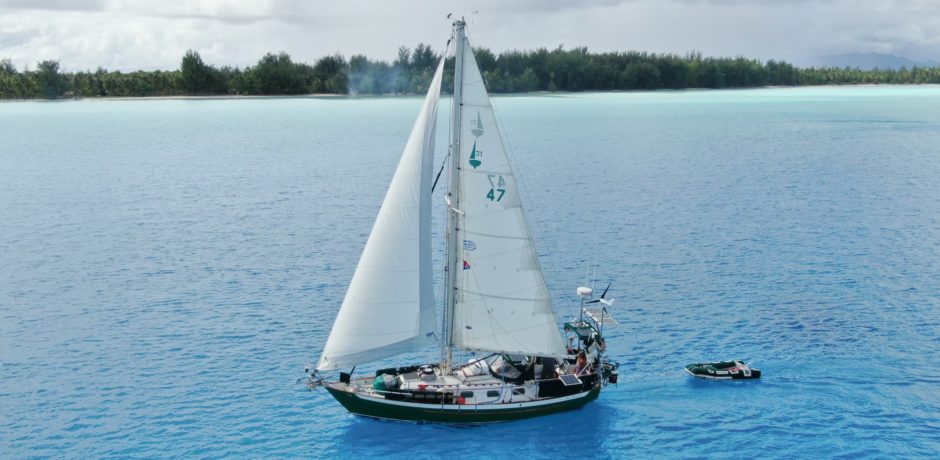
Boy those were all great stories from your adventures in Tonga. Great read. Interesting dynamics in a small community. Sort of like Coloma or Cool only more isolated. So glad you are back on the water and things are going well. You and Rick will be the topic of conversation for a while. Looks like your diet has been great. I can see you have lost weight. You look great.
Thanks, Linda! I have no idea about weight – no scale, no stable platform for one …. But we sure stay active! At least I feel more limber, and so does Rick.